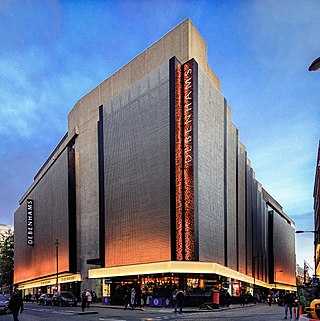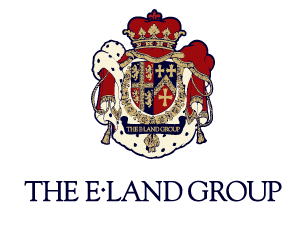
Debenhams plc was a British department store chain operating in the United Kingdom, Denmark and the Republic of Ireland. It was founded in 1778 as a single store in London and grew to 178 locations across those countries, also owning the Danish department store chain Magasin du Nord. In its final years, its headquarters were within the premises of its flagship store in Oxford Street, London. The range of goods sold included middle-to-high-end clothing, beauty, household items, and furniture.

British Home Stores, commonly abbreviated to BHS and latterly legally styled BHS Ltd, was a British department store chain, primarily selling clothing and household items. In its later years, the company began to expand into furniture, electronics, entertainment, convenience groceries and fragrance and beauty products.
River Island is a London-based, multi-channel fashion brand, founded in 1948 by Bernard Lewis. The retailer has a presence in over 125 of worldwide markets, in stores and online.
George William Davies is an English fashion designer and retailer.
TK Maxx is a subsidiary of the American apparel and home goods company TJX Companies. The stores operate throughout the United Kingdom, Australia, Ireland, Germany, Poland, Austria and the Netherlands, totalling 629 stores in Europe and 56 in Australia in May 2020. In Poland, there are a total of 44 stores. The chain uses a slightly different name from that of the TJ Maxx stores in the United States, to avoid confusion with the British retailer T. J. Hughes.

Primark Stores Limited is an Irish multinational fast fashion retailer with headquarters in Dublin, Ireland, with outlets across Europe and the U.S. The original Penneys brand is not used outside of Ireland because it is owned elsewhere by American retailer J. C. Penney.
Harris Scarfe is an Australian retailer that sells bed linen, kitchenware, homewares, electrical appliances and apparel. It was founded in 1849 in Adelaide, South Australia and has more than 50 stores nationally.

E·Land Group (hangul:이랜드그룹) is a South Korean conglomerate headquartered in Changjeon-dong Mapo-gu Seoul, South Korea. E-Land Group takes part in retail malls, restaurants, theme parks, hotels and construction businesses as well as its cornerstone, fashion apparel business. It has operations worldwide through its subsidiary E-Land World.

Ted Baker is a British high-street clothing retail company known for suits, shirts, and dresses. It was founded in 1988 in Glasgow, Scotland. The company is owned by Authentic Brands Group, after its £211 million acquisition in October 2022. The brand has over 500 shops and concessions around the world.

Manchester Arndale is a large shopping centre in Manchester, England. It was constructed in phases between 1972 and 1979, at a cost of £100 million. Manchester Arndale is the largest of the chain of Arndale Centres built across the UK in the 1960s and 1970s. It was redeveloped after the 1996 Manchester bombing.

JD Sports Fashion plc, commonly known as JD Sports, JD or JD Group is a British sports-fashion retail company based in Bury, Greater Manchester, England. It is listed on the London Stock Exchange and is a constituent of the FTSE 100 Index. The Pentland Group owns 55% of the company.
Sanity is an Australian chain of music and entertainment stores and is the country's second-largest retailer of recorded audio and video discs. It is privately owned by Ray Itaoui, and as of March 2023, Sanity closed all of its 49 remaining stores except they kept one store in Sydney. The brand specialises in the sale of CDs, DVDs, Blu-rays and related merchandise and accessories, sold from its network of stores and website. The Sanity brand was owned and conceived by Brazin Limited from 1992, before being folded into BB Retail Capital in 2006, then became a company in its own right after it was divested to Itaoui in 2009. At its peak, there were more than 150 Sanity outlets across every state and territory of Australia.
Venture was a chain of discount department stores that operated in Australia between 1970 and 1994.
United Drapery Stores, or UDS, was a British retail group that dominated the British high street from the 1950s to the early 1980s.
AllSaints is a British fashion retailer headquartered in London, UK. AllSaints sells menswear, womenswear, footwear, and accessories in 281 stores, and has approximately 2,400 employees across 27 countries and regions including the UK, France, Ireland, USA, Mexico, Canada, Taiwan, Japan, South Korea and China.

Hunkemöller is a global omnichannel retailer specialising in lingerie and related products. The company was founded in 1886 in Amsterdam as a speciality shop for corsets. Today, it is a brand with more than 7,400 employees in 19 countries. Hunkemöller is a market leader in the Netherlands, Belgium, Denmark and Germany.
Off-price is a trading format based on discount pricing. Off-price retailers are independent of manufacturers and buy large volumes of branded goods directly from them. The off-price retail model relies on the purchase of over-produced, or excess, branded goods at a lower price, thus being able to sell to consumers at a discount compared to other stores which purchased an initial run. Among the largest retailers of this type are TJX Companies and Ross Stores. The model is more common in countries that import fashion-oriented or household goods, as the discount role in producer countries is usually filled by factory outlets or small-scale open-air marketplaces.
Tessuti is a chain of designer stores in the United Kingdom, retailing men’s and women’s designer collections, including clothing, shoes and accessories for men and women. Tessuti was founded in 1985 by David Light. In December 2022, Frasers Group acquired Tessuti from JD Sports Fashion plc who had previously owned the company in full since 2016.
The retail format influences the consumer's store choice and addresses the consumer's expectations. At its most basic level, a retail format is a simple marketplace, that is; a location where goods and services are exchanged. In some parts of the world, the retail sector is still dominated by small family-run stores, but large retail chains are increasingly dominating the sector, because they can exert considerable buying power and pass on the savings in the form of lower prices. Many of these large retail chains also produce their own private labels which compete alongside manufacturer brands. Considerable consolidation of retail stores has changed the retail landscape, transferring power away from wholesalers and into the hands of the large retail chains.
Debenhams.com, a trading name of Debenhams Brands Ltd, is an online retailer owned by Boohoo.com. The company was formed in 2021 after Boohoo purchased the website operations and rights to the name of the department store group Debenhams, which had entered liquidation.









